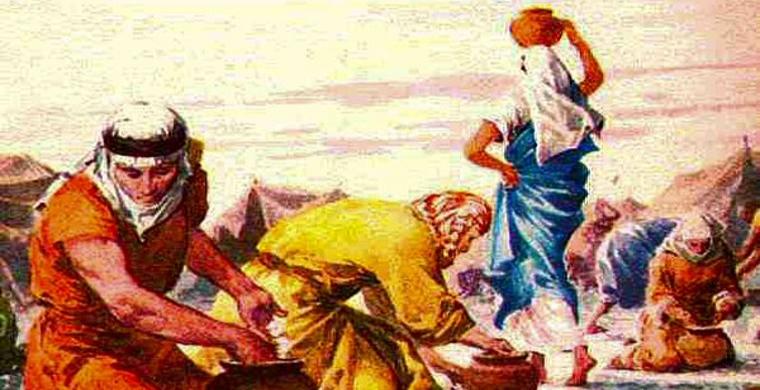ISRAEL'S MANNA AND JESUS' MANNER: Exodus 16 : 2 - 7a
The Lord Jesus makes amends for failed Israel
By Roger Salter
Special to VIRTUEONLINE
www.virtueonline.org
March 15, 2018
As a servant people Israel received the vocation to make the Lord known to the nations of the earth through obedience to his will that would produce in the chosen race a moral and spiritual likeness to his holy and gracious character. Through word, worship, and the well being of a community blessed by God, the Hebrews were to create an attraction that would draw the Gentiles to Yahweh. Zion was to be a light to the world commending universal knowledge of its Lord. The record shows that the chosen people as a whole reneged on their calling, choosing to depart from the way of their God. Jesus in his incarnate life upon earth retraced the history of Israel in order to correct its deviancy and fulfill its assignment. The events of his life were to match the occurrences of Israel's past, his righteous obedience countering the errors of Abraham's ethnic descendants.
This is Jesus' ultimate role in the purpose of God - to fashion a righteousness on behalf of those who are consciously and contritely moral failures and into which righteousness we can enter by the portal of faith and receive the favor of the Lord. If we accurately discern the trends of Israel's story, and what its religious experience was meant to be - through events, signs, symbol, etc - we can gain a good idea as to the route through life the Messiah was to follow and dutifully adopt (e.g. sojourn in and emergence from Egypt, divine instruction from the mount as the new Moses, miraculous provision of bread for the masses, matching the twelve to the number of tribes).
Jesus sums up and embodies the mission of Israel, therefore it is not the church itself, so much, that is the new Israel, but it is rather that through faith in Christ believers are incorporated within the true Israel, Jesus himself, an Israel now accessible to every believing Gentile and Jew. In Christ we are admitted to the covenant community, which is now termed the Body of Christ, which he inhabits, enlivens, thus coordinating every part as an instrument or organ of divine devotion and service, the entity that Israel was intended to be.
He reconstitutes Israel in his own person and practice.
Believers in the Gospel are admitted to the spiritual version of Jacob's people. In reading our passage from Exodus, a book of figurative (typological) description as to the career of the Redeemer, we note a foretelling of the steps that he must take.
"In the desert the whole community grumbled against Moses and Aaron. The Israelites said to them, "If only we had died by the Lord's hand in Egypt! There we sat around pots of meat and ate all the food we wanted, but you have brought us out to starve this entire assembly to death. Then the Lord said to Moses, 'I will rain down bread from heaven for you. The people are to go out each day and gather enough for that day. In this way I will test them and see whether they will follow my instructions. On the sixth day they are to prepare what they bring in, and that is to be twice as much as they gather on the other days.' So Moses and Aaron said to all the Israelites, 'In the evening you will know that it was the Lord who brought you out of Egypt, and in the morning you will see the glory of the Lord."
There was Israel, grumbling at its leaders and criticizing the purpose of God, and at the same time glamorizing their previous dire condition. Israel's disposition towards the will of God was being tested and at heart they were reluctant reliers upon the Lord, unwilling representatives of his Name, both throughout the desert wanderings and subsequently as residents of the Promised Land. "For forty years I was angry with that generation: I said 'They are a people whose hearts go astray and they have not known my ways'" (Psalm 95, The Venite).
This incident of Israel's discontent and murmuring is the precedent for Jesus' testing period of forty days in the wilderness. Our Savior rectified the poor performance of the rebel "servant nation" without complaint and resistance of spirit. Yielding in obedience to the Father he submits to the terms of necessary trial, a preparation for his Calvary ordeal.
Accordingly and prospectively, he drives away the anger due to every generation of sinners that through confidence in and compliance with him come to know the Lord. This is an illustration of what it means to be saved by the righteousness of Christ credited to us: a) His active righteousness whereby he fulfills the obedience due to God on our behalf. We by nature have neither desire nor ability to perform conformity to the will of God. He makes things right for us. b) His passive obedience whereby he bears the consequences of our sin and frees us from death as our penalty-bearing Substitute.
From cradle to cross he ungrudgingly strove and suffered for our salvation. The salvation to which Israel was to witness was wrought by the Perfecter and Accomplisher of Israel's task - to be a blessing to the nations. In him we see the glory of the Lord, the glory of free redeeming grace that reaches out to all offenders, Jew and Gentile, proffering forgiveness for all our histories of grave offenses.














